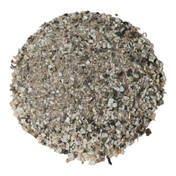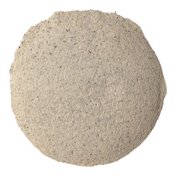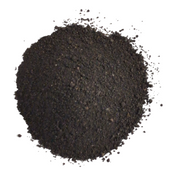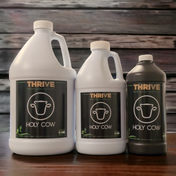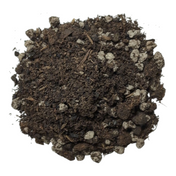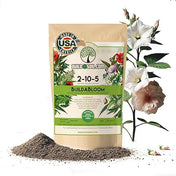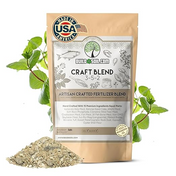Read The Intro or Click Here for the Full Book.
Introduction to Bread From Stones
by Dr. Raymond Bernard (A.B., M.N., Ph.D.)
Dr. Julius Hensel was the greatest figure in the history of agricultural chemistry even if his powerful enemies, members of the octopus chemical fertilizer trust, have succeeded in suppressing his memory, destroying his books and getting his Stone Meal fertilizer off the market. But eventually the truth comes to the fore, and its enemies are vanquished. Julius Hensel's pioneer work in opposing the use of chemicals in agriculture, a half a century later, found rebirth in the Organic Movement which has swept through the world. But Hensel is more modern than the most modern agricultural reformer, for he claimed, on the basis of theoretical chemical considerations, and supported by practical tests, that his Stone Meal can replace not only chemical fertilizers but all animal ones as well.
It was the German agricultural chemist Liebig who first put forward the phosphorus-potash-nitrogen theory of chemical fertilization. This false doctrine Hensel bitterly attacked and in so doing, won the ire of the financial interests behind the sale of chemical fertilizers, which used agricultural authorities and university professors to denounce poor Hensel as a charlatan and his Stone Meal as worthless.
Though his fight against chemical fertilizers was a losing battle and he died as a defeated hero, it took a generation for Hensel's efforts to bear fruit in the modern Organic Movement, which has not given its founder the credit due him.
The fight between Liebig, advocate [of] one-sided chemical fertilization, and Hensel, who advocated a more balanced form of plant nutrition, including the trace minerals which Liebig completely overlooked, was a battle between an opportunist, who sought to further the sales of chemical fertilizers, and a true scientist, interested in humanity's welfare.
Though Liebig, with the Chemical Trust behind him, won the battle, Hensel's ideas finally triumphed... several decades after his passing.
Liebig claimed that plants require three main elements—nitrogen, phosphorus and potash—the basis of which conception chemical fertilizers were manufactured that supplied these elements. On the other hand, Hensel claimed that plants need many more than these three major elements, stressing the importance of the trace minerals, which at that time were ignored. In place of chemical fertilizers, supplying only three elements in an unnatural, caustic form, Hensel recommended the bland minerals of pulverized rocks, especially granite, a primordial rock which contains the many trace minerals that meet all needs of plant nutrition.
Hensel first made his discovery of powdered rock fertilization when he was a miller.
One day, while milling grain, he noticed that some stones were mixed with it and [he] ground [them] into a meal. He sprinkled this stone meal over the soil of his garden and was surprised to note how the vegetables took on a new, more vigorous growth. This led him to repeat the experiment by grinding more stones and applying the stone meal to fruit trees. Much to his surprise, apple trees that formerly bore wormy, imperfect fruit now produced fine quality fruit free from worms. Also vegetables fertilized by stone meal were free from insect pests and diseases. It seemed to be a complete plant food, which produced fine vegetables even in the poorest soil.
Encouraged by these results, Hensel put his "Stone Meal" on the market, and wrote extensively on its superiority over chemical fertilizers, while at the same time opposing the use of animal manure, and the nitrogen theory on which it is based, claiming that when plants are supplied with Stone Meal, plenty of water, air and sunshine, they will grow health-fully even if the soil is poor in nitrogen, since it was his belief that plants derive their nitrogen through their leaves, and do not depend on the soil for this element.
In opposing this use of chemical fertilizer, Hensel awoke the ire of a powerful enemy, which was resolved to liquidate him—the Chemical Trust. Through unfair competition, Hensel's "Stone Meal" business was destroyed and his product was taken off the market. However, the chief object of attack was his book, Bread From Stones, in which he expounded his new doctrines of Liebig on which the chemical fertilizer business was based, as well as the "Liebig meat extract." (For Hensel advocated vegetarianism, just as he advocated natural farming without chemicals or manure.)
Accordingly, his enemies succeeded in suppressing the further publication of this book and in removing it from libraries, until it became extremely rare and difficult to obtain. It is more fortunate that a surviving copy came into the writer's possession.
Dr. Julius Hensel was not only a student of agricultural chemistry, but also biochemistry and nutrition, and he related all these sciences, and united them into a composite science of life, which he labeled "Makro-biology." His theory was that the chemistry of life is basically determined by the chemistry of the soil, and that chemicals unbalance and pervert soil chemistry while powdered rocks help restore normal soil mineral balance, producing foods favorable to health and life.
His discoveries concerning the value of powdered rocks as soil conditioners and plant foods, though rejected and ridiculed when he first proposed them, were adopted by agricultural science nearly a century later, when the application of powdered limestone, rock phosphate and other rocks became standard agricultural practice. Granite, which Hensel recommended as the most balanced of all rocks as source of soil minerals, was first rejected as worthless, but later appreciated and used as a soil mineralizer.
During the course of his researches, Dr. Hensel found that in the primeval rocks, as granite, lie a potentially inexhaustible supply of all minerals required for the feeding and regeneration of the soil, plants, animals and man. All that is required is to reduce them to finely a pulverized form, so that their mineral elements may be made available to plants. Hensel wrote a book describing his discovery of a new method of creating more perfect fruits and vegetables, rich in all nutritional elements and immune to disease and insect pests, with the result that it produced worm-free fruit without the need of spraying. The foods so produced by rock-meal fertilization were true Organic Super Foods, far superior in flavor and value than those produced under the forcing action of manure or chemical fertilizers.
Hensel was the first to put up a fight against the then-growing new chemical fertilizer industry—a struggle that was continued in the next century by Sir William Howard in England and J. I. Rodale in America.
The use of chemical fertilizers, claimed Hensel, leads to the following evil consequences:
-
It poisons the soil, destroying beneficial soil bacteria, earthworms and humus. *
-
It creates unhealthy, unbalanced, mineral-deficient plants, lacking resistance to disease and insect pests, thus leading to the spraying men-ace in an effort to preserve these defective specimens.
-
It leads to diseases among animals and men who feed on these abnormal plants and their products.
-
It leads to a tremendous expense to the farmer, because chemical fertilizers, being extremely soluble, are quickly washed from the soil by rainfall and needs constant replacement. (Powdered rocks, on the other hand, being less soluble, are not so easily washed from the soil, but keep releasing minerals to it for many years).
* Decayed vegetable or animal matter that provides nutrients for plants.
The use of various pulverized rocks, [such] as granite, limestone, rock phosphate, etc., in place of chemical fertilizers, will lead, claimed Hensel, to permanent restoration of even poor soils to the balanced mineral con-tent of the best virgin soils; and the rock dust thus applied will remain year after year and not be washed away by rains or irrigation water, as is the case with highly soluble chemical fertilizers.
This will be an economic saving to the grower and enable him to sell foods at a lower price than when he must spend large sums on chemical fertilizers. Also, since foods thus mineralized are healthy and immune to plant diseases and insect pests (as Hensel experimentally demonstrated), there is no need for the expense and dangers of spraying.*
* Editor's Note: Rock phosphate from some sources contains a high level of the toxic mineral cadmium. It's wise to purchase rock phosphate from a supplier who's able to provide an analysis or avoid Phosphate.
Foods raised by Hensel's followers, including many German gardeners and farmers, who were enthusiastic in praise of his method, were found to possess firmer tissue and better shipping and keeping qualities than those raised with animal manure or chemicals. And most important among the advantages of Hensel's agricultural discovery is that foods grown on mineralized soil are higher both in mineral and vitamin content and so pro-duce better health and greater immunity to disease than those grown by the use of chemical fertilizer sprays.
To kill insects by poisons applied to plants does not remove the cause of their infestation, and poisons both the insect as well as the human consumer of the sprayed plant. Only correct feeding of the soil, and consequently of plants by trees, by proper methods of fertilization, thereby keeping them well-nourished, vigorous and free from disease, will accomplish this, for insects do not seem to attack healthy plants. It appears that insects, like scavengers, attack chiefly unhealthy and demineralized plants, not healthy ones.
Dr. Charles Northern has performed experiments in which he raised two tomato plants, entwined with each other, in different pots, one being supplied with an abundance of trace minerals, derived from colloidal phosphate, and the other just chemical fertilizer. The tomato plant grown with chemical fertilizer alone was attacked by insects, while the other one given trace minerals was not.
Hensel pointed out that animal manure and chemical fertilizers produce a forced, unnaturally rapid growth of large-sized produce which fail to acquire the minerals normally secured during a slower, longer development. The result is the production of demineralized, unbalanced plants, which are weak and unhealthy, falling prey to disease and insect pests.
This explains why, coincident with the increased use of chemical fertilizers, during the past century, insect pests steadily increased. So did cancerous conditions among plants, animals and humans, as shown by Keens, an English soil chemist, who presents statistics to show that the increased use of chemical fertilizers is a major cause of the greater incidence of cancer during that last hundred years.
The modern Organic Farming movement has accepted and propagated one of Hensel's theories—his opposition to chemical fertilizers and recommendation of powdered rocks in their place—but has failed to appreciate his other main doctrine—his opposition to the use of animal excrement's as plant foods. In this respect, Hensel, though he lived in the last century, [was] far ahead of the Organic Movement and more modern than the most modern agricultural reformer.
Hensel had a great admirer and disciple in England, one Sampson Morgan, who founded his "Clean Culture" doctrine on Hensel's philosophy of soil and biological regeneration by the avoidance of chemical or animal fertilizers. While Hensel was more of a theorist, Morgan was a practical farmer and agricultural experimenter, who proved the truth of Hensel's theories by winning the first prize at all agricultural exhibits at which his super-sized, super-quality, disease - and blight - free rock-dust fertilized fruits and vegetables were displayed. In Sampson Morgan's Clean Culture, Morgan's views are presented.
In reality they are Hensel's doctrines transplanted to English soil. The reading of Morgan's book will be a valuable supplement to [the reading] of this, to give one a thorough understanding of the subject of Natural Agriculture (i.e., a system of soil culture definitely in advance of Organic Gardening by the compost method).
Practical experience with Hensel's Stone Meal and his non-animal method of soil regeneration, has proven the following:
That Stone Meal creates healthier, tastier, more vitaminized and mineralized foods.
That Stone Meal creates immunity to insect infestation, worms, fungi and plant diseases of all kinds.
That Stone Meal improves the keeping and shipping quality of foods, so that they keep a long time, in contrast to the rapid deterioration of foods given abundant animal manure.
That Stone Meal helps plants to resist drought and frost, enabling them to survive when those fed on manure and chemicals perish.
That Stone Meal produces larger crops which are more profitable because the farmer is saved the expense of buying chemical fertilizers which are rapidly leached from the soil by rainfall, whereas Stone Meal, being less soluble, is gradually released during the course of years and remain in the soil, being the most economical of fertilizers.
That foods raised with Stone Meal are better for human health and the prevention of disease than those grown with chemicals or animal manure.
That use of Stone Meal, in place of chemical or animal fertilizers, helps to end the spraying menace (by removing its cause) is proven by the fact that plants and trees grown with Stone Meal are immune to pests and so require no spraying.

